Sexual Health
- Private & Confidential
- Same day appointments
- Instant & Lab Tests available
- Follow up with Sexual Health Consultant available
At Rejuvence Medical we provide a discreet and comprehensive sexual health checking service. We provide a selection of diagnostic tests. We aim to provide results as quickly as possible and ensure we maintain your privacy and dignity at all times.
Select the test you are looking for:
The importance of sexual health
In today’s society it is essential we look after our sexual health. At Rejuvence rest assured we will always look to maintain your privacy. We can provide advice on looking after your sexual health. All our doctors are extremely experienced and we always ensure that we provide a non-judgemental and empathetic service.
Conditions we test for
We are able to provide diagnostic testing for a number of sexually transmitted infections.
- What is HIV? HIV is a chronic and life-threatening immunodeficiency disease. It damages the body’s immune system and limits its ability to fight infection.
- How common is it? As of 2018 there were approximately 37.9 million people internationally living with HIV/AIDS.
- Does it affect males and females? Currently, more than half of the number of people living with HIV/AIDS are women, though it often men as well.
- What age groups? HIV can affect any age group but is most common in people between the ages of 25-55 years.
- What are the main symptoms? HIV can present in many ways. Symptoms can include rapid weight loss, recurrent fever and night sweats, extreme fatigue, prolonged swelling in the lymph glands of the armpits, groin and neck, long-lasting diarrhoea, sores in the mouth, anus and genitals. Initial presentation of HIV can also be in the form of unusual (atypical) infections, caused by viruses or bacteria that most are able to fight off.
- How is it tested for? Testing for HIV can be done with an antigen/antibody test that works rapidly. This is usually in the form of a blood sample.
- Is there a cure? No, HIV has no known cure.
- How is it treated? Antiretroviral therapy (ART) is a system of medications used to treat HIV on a daily basis. They are in the form of a combination of tablets that need to be taken daily. Antiretrovirals will not cure HIV, but can sufferers live longer and healthier lives. Those who manage their medication well, often have no symptoms but need to be monitored on a regular basis.
- What is Hepatitis B? Hepatitis B is an infection of the liver that can cause scarring of the organ, liver failure and cancer. If left untreated it can be fatal. It is spread through blood, open sores or sexual bodily fluids of an infected person.
- How common is it? Hepatitis B is difficult to estimate in terms of commonality as many people have no symptoms and are unaware that they are infected.
- Does it affect males and females? Hepatitis B can affect both men and women.
- What age groups? The highest rates of infection are in people between the ages of 30-40 years.
- What are the main symptoms? Common symptoms of Hepatitis B include jaundice, light-coloured stool, fever, persistent fatigue lasting for weeks or months, stomach problems and loss of appetite and pain in the belly area.
- How is it tested for? Hepatitis B can be tested for through blood tests, liver ultrasound scan and a liver biopsy.
- Is there a cure? Though Hepatitis B is treatable, there is no known cure for it.
- How is it treated? Treatment for Hepatitis B could include antiviral medications that will help to boost the immune system and slow down the virus
- What is Hepatitis C? Hepatitis C is an infection of the liver that can be very serious and cause major liver damage. It is a viral infection that is contracted through contact with infections fluids and secretions from others who carry the disease.
- How common is it? Hepatitis C is one of the three most common forms of liver diseases.
- Does it affect males and females? Hepatitis C can affect both men and women.
- What age groups? Men between the ages of 30-49 years have the highest occurring rates of Hepatitis C infection.
- What are the main symptoms? Symptoms of Hepatitis C can include feeling very tired and having sore muscles, joint pain, fever and nausea, loss of appetite, stomach pain, itchy skin and dark urine.
- How is it tested for? Hepatitis C Antibody test is used to diagnose Hepatitis C. This is from a blood sample.
- Is there a cure? In most cases, yes, hepatitis C can be fully curable.
- How is it treated? Hepatitis C is treated with an antiviral medication that is taken orally over the course of 12 weeks with the goal of eliminating the disease from the patient.
- What is Chlamydia? Chlamydia is a tiny parasitic bacterium that requires a host in order to survive and is a sexually transmitted disease (STD).
- How common is it? Chlamydia is the commonly reported STD.
- Does it affect males and females? Chlamydia can affect both men and women.
- What age groups? It is most common in young people between the ages of 15-24 years old.
- What are the main symptoms? Symptoms of the infection vary between men and women. Women often experience pain during urination and sex as well as pain in the lower abdomen, abnormal vaginal discharge and bleeding between periods. In men pus or a watery discharge from the penis and swelling or tenderness in the testicles can be expected.
- How is it tested for? Testing for chlamydia can be done through a urine sample or in women through a swab of the cervix.
- Is there a cure? Yes, chlamydia can be cured through treatment.
- How is it treated? Treatment is with oral antibiotics for 7-14 days and usually clears up in about a week.
- What is Syphilis? Syphilis is a sexually transmitted disease (STD) and has a chronic nature. It can be especially significant in infected pregnant women and affect their unborn foetus..
- How common is it? Syphilis is a very common STD.
- Does it affect males and females? Syphilis can affect both men and women.
- What age groups? Syphilis most commonly affects people between the ages of 15-29 years.
- What are the main symptoms? The main symptoms of syphilis are headaches, extreme fatigue, weight and hair loss, swollen glands, sores in the mouth, vagina or anus, a skin rash that may cause small, reddish-brown sores and aching muscles.
- How is it tested for? Common tests done for syphilis are rapid plasma regain (RPR) tests, as well as venereal disease lab (VDRL) testing to check the blood or spinal fluid to detect a specific antibody in people with syphilis.
- Is there a cure? In its early stages, syphilis is easily curable.
- How is it treated? Syphilis is treated with one intramuscular injection of a long acting penicillin.
- What is Gonorrhoea? Gonorrhoea is a sexually transmitted disease, that affects the urethra, rectum or throat as well as the cervix in women.
- How common is it? Gonorrhoea is very common affecting about 820,000 people in the US each year.
- Does it affect males and females? Both men and women can be affected by gonorrhoea.
- What age groups? In men, those between the ages of 20-23 years old had the highest rate of infection, though overall people between the ages of 15-44 years old are commonly infected.
- What are the main symptoms? Common symptoms of gonorrhoea are increased vaginal discharge, pain during urination, bleeding between periods and after sex as well as pain during sex, and abdominal or pelvic pain.
- How is it tested for? Urine tests are most commonly used to test for gonorrhoea but if the infection is in the anus or throat then swabs may be used to collect samples.
- Is there a cure? Yes, gonorrhoea can be cured with proper treatment.
- How is it treated? Most doctors will use a one-time injection of an antibiotic as well as prescribe a daily dose of another antibiotic to be taken orally until the infection clears up.
At Rejuvence Medical we are able to offer a variety of different diagnostic tests for sexually transmitted infections. The majority of sexually transmitted infections are tested either using a blood sample, a urine sample or a vaginal/penile swab.
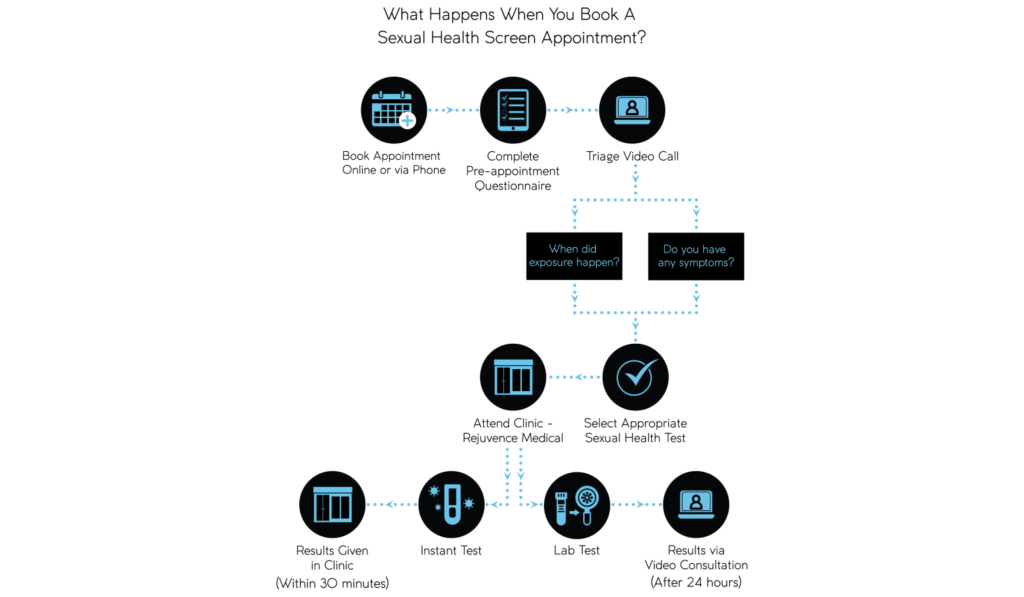
Blood Tests
A conventional blood test is used to test for HIV, Hepatitis and Syphilis. Blood samples are taken and sent to the lab. Results are usually made available within 24 to 36 hours.
Swab Tests
A swab test from the penis or vagina is used to test for Chlamydia and Gonorrhoea. The swab is then sent off to the lab for analysis. Results are usually made available within 24 to 36 hours.
Instant Tests - Get your results within 30minutes
An Instant Test is also known as a lateral flow test that normally looks for antibodies and/or antigens associated with the infection in question. This involves using a finger prick lancet to get a small amount of blood from the tip of your finger. This is then placed in the well of specialised testing cassettes, similar to a pregnancy test. These tests normally take between 15 to 20 minutes and the result is displayed in the form of a line across the results panel – again very similar to a pregnancy test. The accuracy of these tests are excellent and you can have your results within 30 minutes of your arrival.
In the case of Gonorrhoea and Chlamydia, a swab from the tip of the penis or vagina is needed to do an Instant Test. These swabs can be uncomfortable but results are available within 30 minutes.
How soon can I get tested?
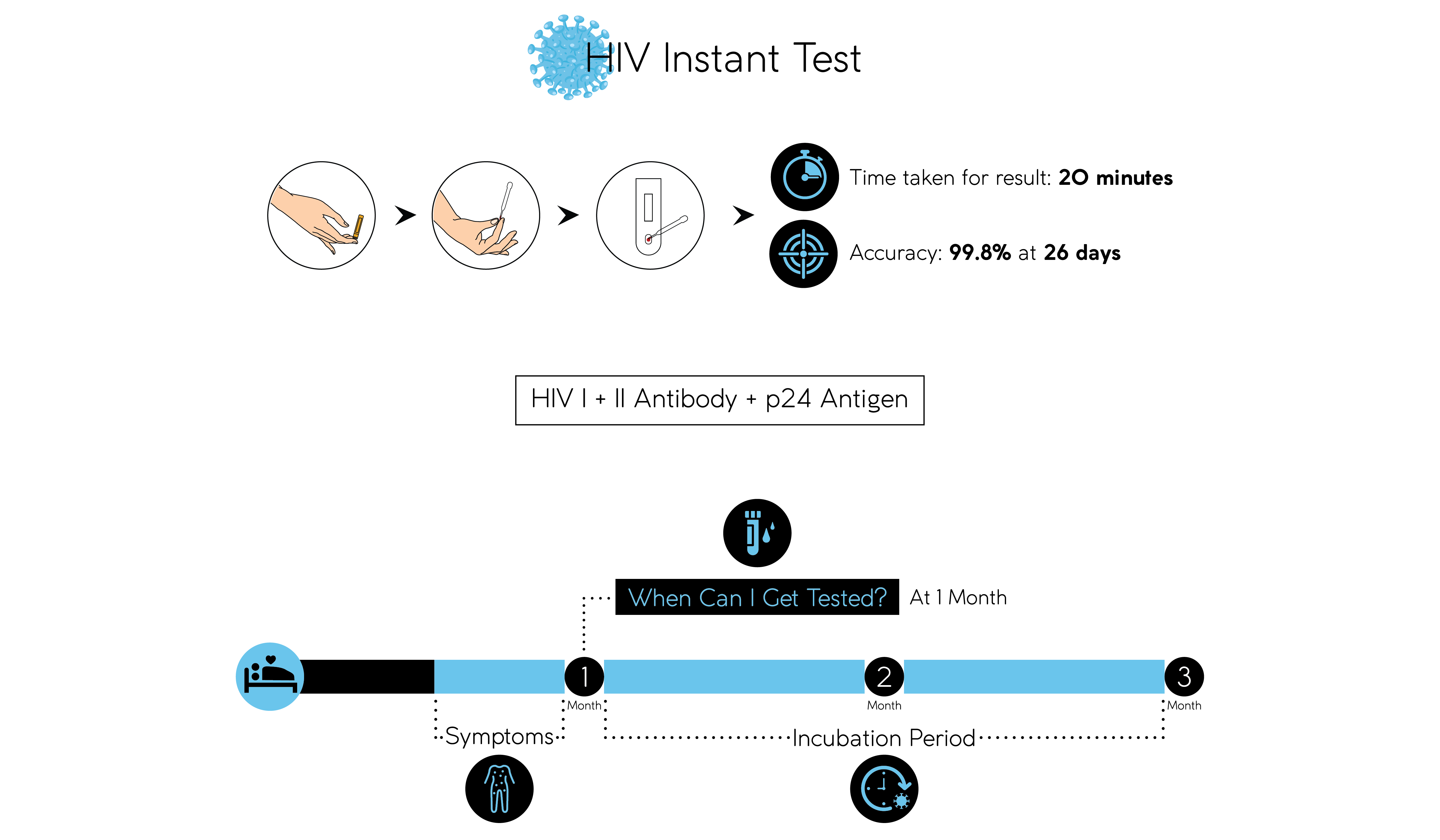
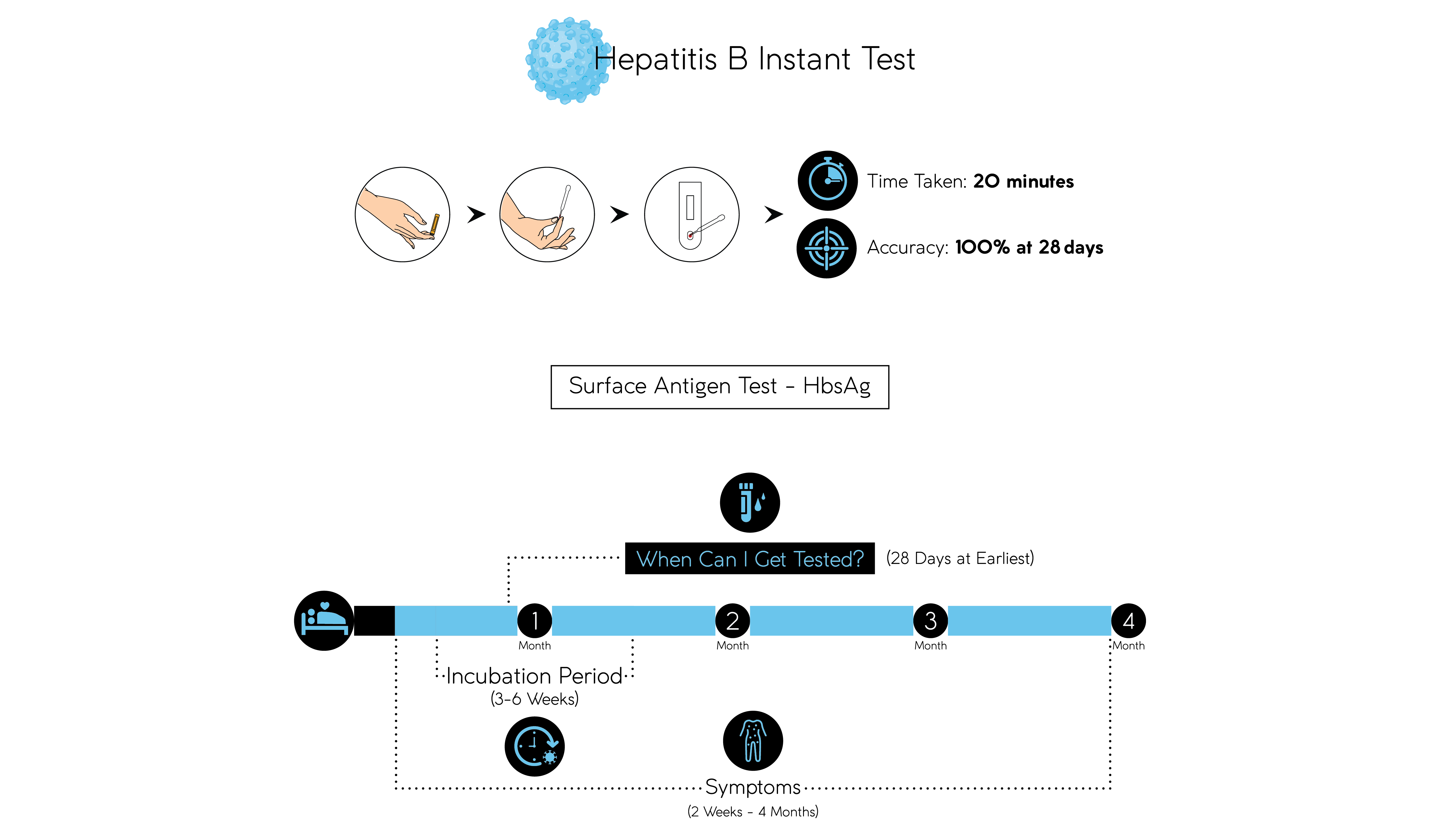
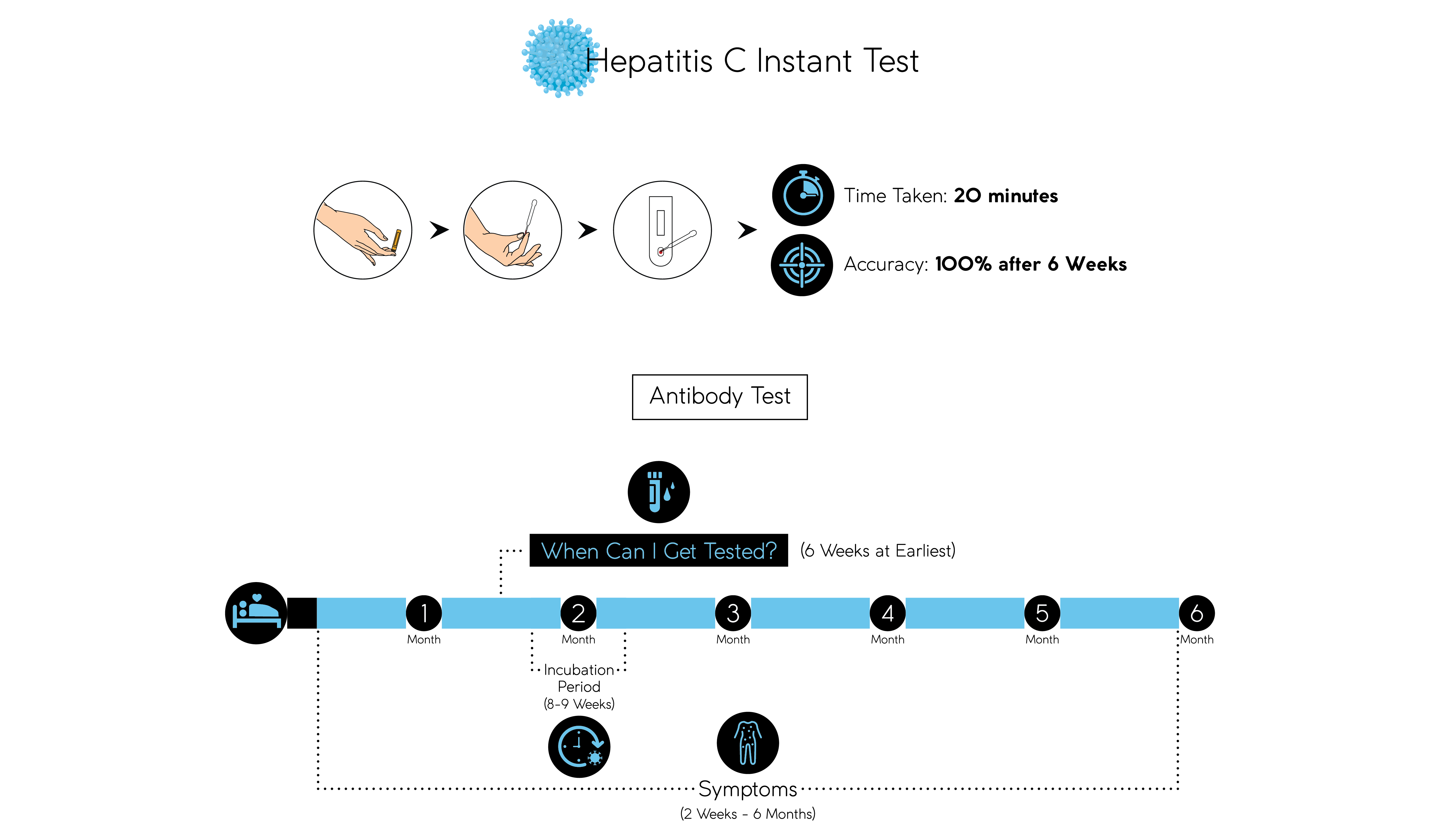
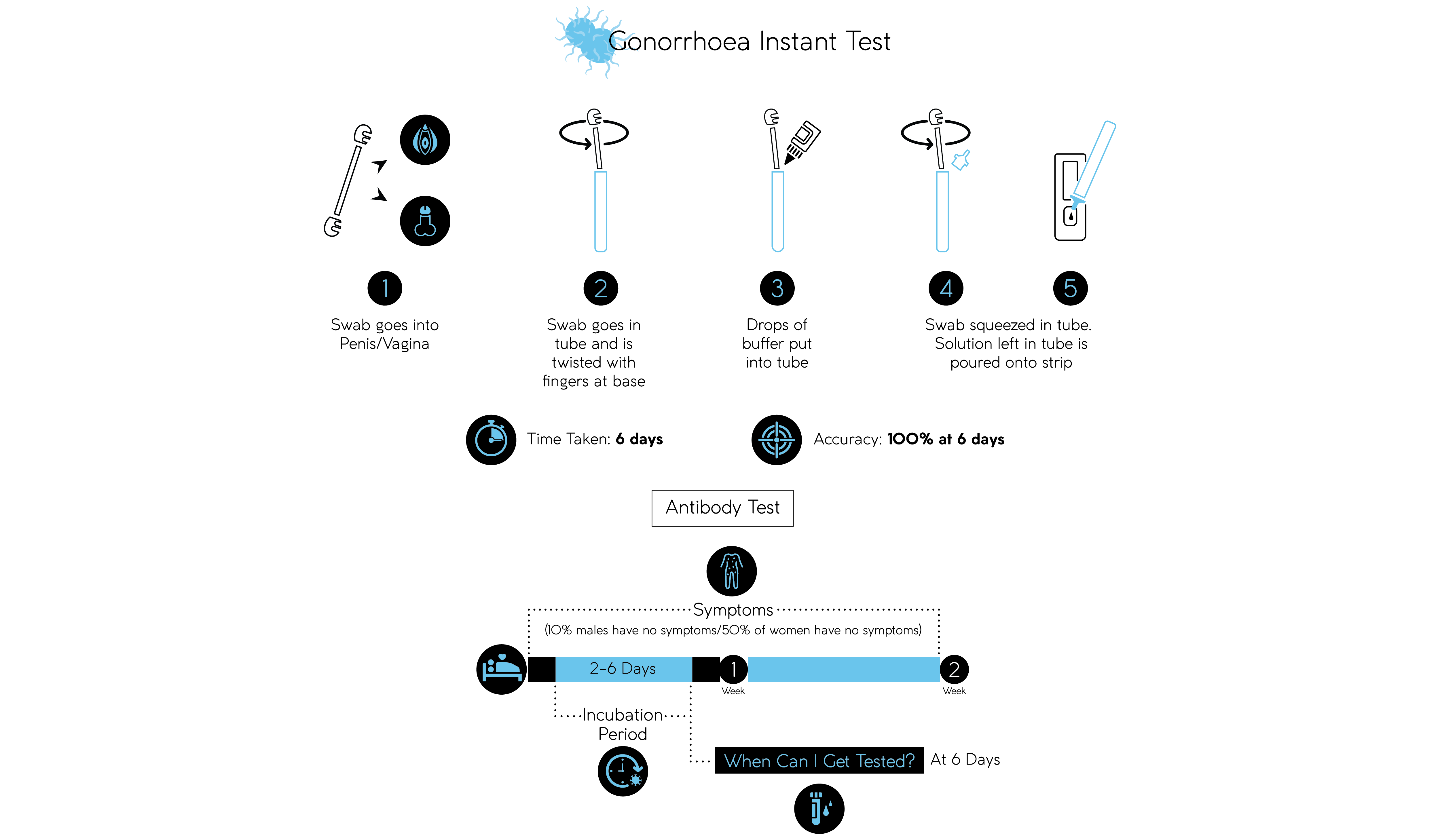
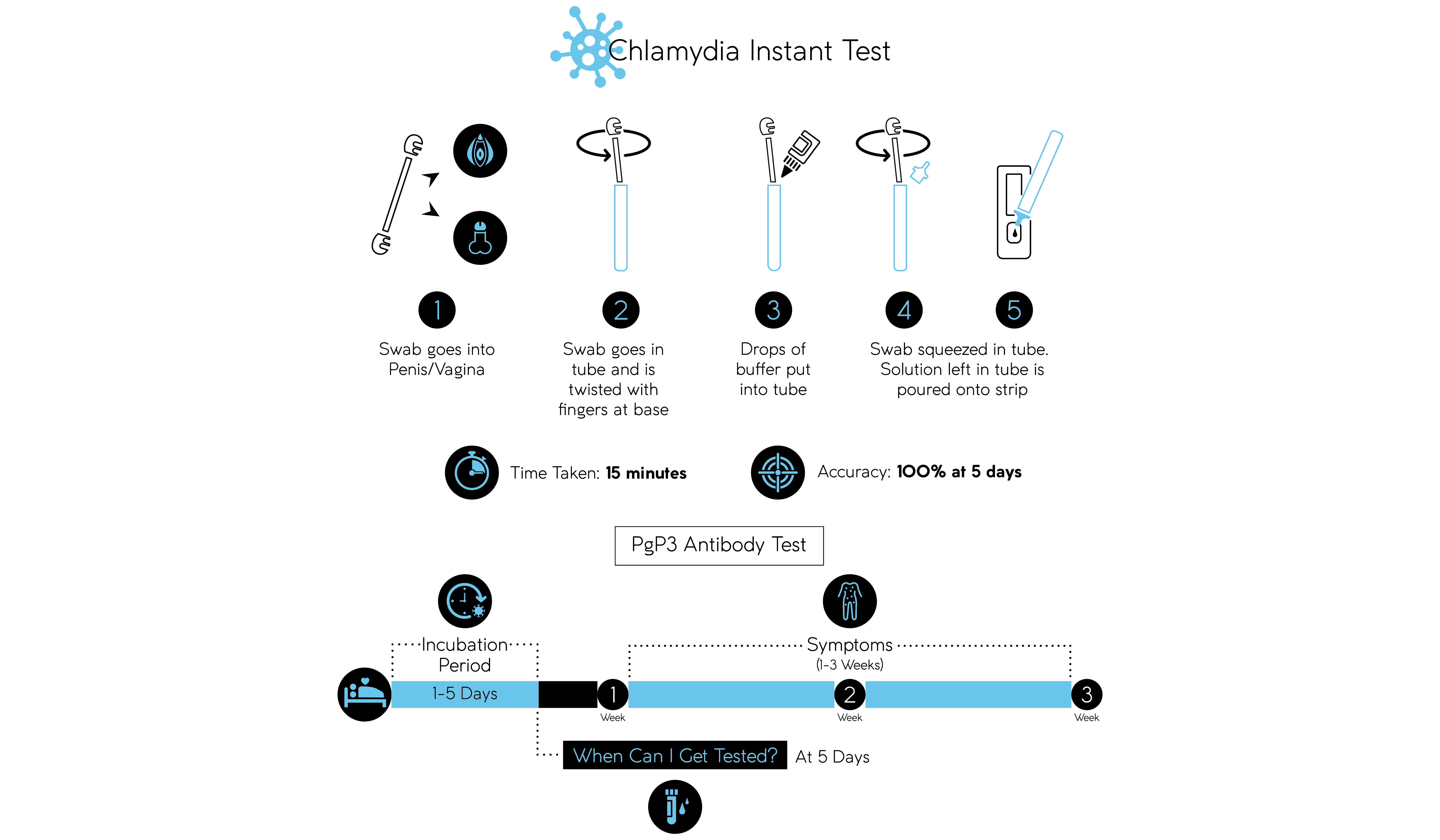
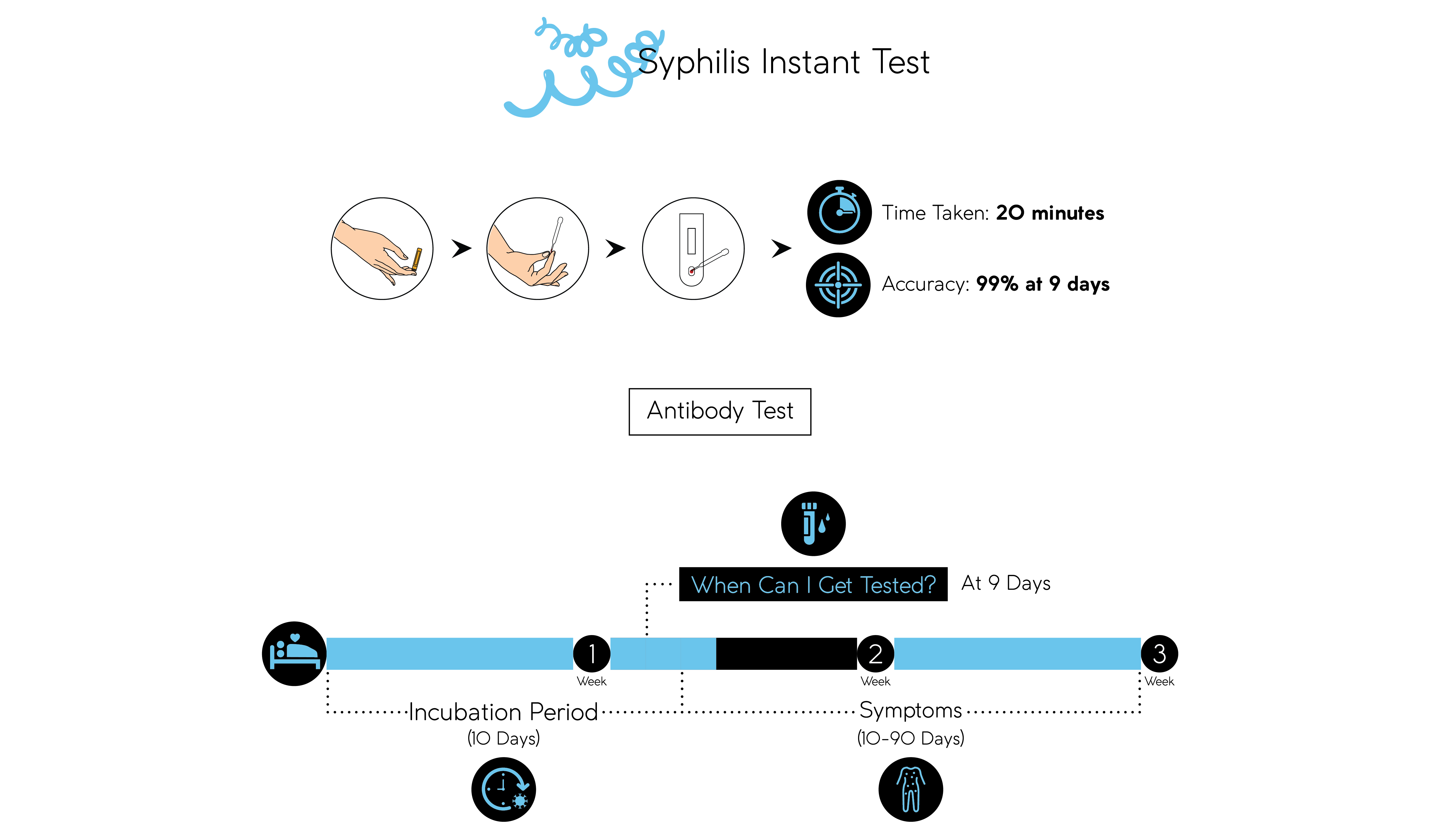
If you are concerned about exposure to a sexually transmitted infection it is understandable that you will be feeling extremely anxious. It is normal that you will want to know as soon possible whether you have been infected. However, for accurate results the timing of your sexual health test relative to when you were exposed, is extremely important and varies depending upon what we are testing for. In the majority of cases a retest will also be needed to give you the all clear.
When testing for HIV, Hepatitis B, and Hepatitis C, a minimum period of 28 days from the time of exposure is needed for an accurate test result, whether it be an Instant Test or Lab Test. This is known as the Incubation Time. However, this also means a long extremely nerve racking wait. If you are worried about exposure to HIV, Hepatitis B or Hepatitis C you should not wait and contact us immediately. In high risk exposure cases, it may be necessary to start Post-Exposure Prophylaxis Treatment (PEP) immediately with follow-up in a sexual health clinic. When testing for Syphilis, Gonorrhoea and Chlamydia, the incubation time varies from 5 to 10 days.
In the case of high risk exposure and where the concern is regarding HIV, Hepatitis B, Hepatitis C and/or Syphilis an early detection screen can be arranged. An early detection screen is a special blood test that can detect evidence of the HIV, Hepatitis B and C viruses as well as Syphilis bacteria at 10 days after exposure. This is not a rule OUT test. If the Early Detection Test is negative, a repeat test should be carried out at 28 days after exposure.
An Early Detection Screen is a special type of blood test that uses PCR (Polymerase Chain Reaction) technology to identify HIV1 and HIV2 RNA for HIV, HBV DNA for Hepatitis B and HCV RNA for Hepatitis C. The Early Detection Screen identifies IgM and IgG for syphilis. Results are normally available within 24 hours.
Select the test you are looking for:
Our Philosophy
At Rejuvence medical we understand how nerve wracking it can be when you have concerns regarding potential sexually transmitted diseases. You will find us empathetic, discreet, non-judgemental and also extremely easy to talk to. We provide a comprehensive and rapid sexual health screening service. If you are concerned regarding your sexual health, don’t delay. Book a consultation with one of our experienced doctors and we will do our best to address your worries and needs.
